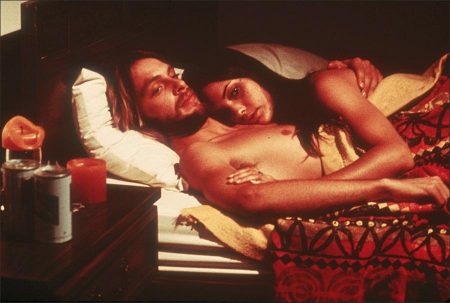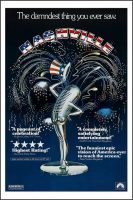Nashville movie storyline. Five days in the Nashville country and gospel music scene, filled with stars, wannabe stars, and other hangers-on – individual stories of this small group intertwined – provides a commentary on American society.
The stars include: good ol’ boy Haven Hamilton, whose patriotic songs leading up to the American bicentennial belie his controlling and ruthless nature; Barbara Jean, the country music darling who is just returning to Nashville and performing following recovery from a fire-related injury which may have taken more of an emotional toll than a physical one; and good looking and charismatic Tom Frank, one-third of the successful group Bill, Mary, and Tom, he who is trying to go solo, which masks his need to not be solo in his personal life as he emotionally abuses woman after woman in love with him, including Mary who is married to Bill.
The wannabe stars include: Albuquerque, whose real name is Winifred, who is trying to run away from her husband Star in he not approving of her career choice; and Sueleen Gay, a waitress who will do anything to make it big in music despite being told directly that she has no singing talent.
Tying their stories together are: Opal, a supposed reporter for the BBC who is working on a documentary and is searching for whatever angle she can; John Triplette, a Yankee in town to organize political fundraisers, including a country music outdoor concert, for third party (the Replacement Party) presidential candidate, populist Hal Phillip Walker, who has the potential to take just enough votes to affect the election; and Martha, who has renamed herself L.A. Jones, who is in town to visit her hospitalized ailing aunt, but who instead decides to be a groupie to any country music star she can find.
Nashville (1975) is maverick director/producer Robert Altman’s classic, multi-level, original, two and a half-hour epic study of American culture, show-business, leadership and politics – and one of the great American films of the 1970s. Its emergence at the end of two troubling eras (Watergate and the Vietnam War) and on the eve of the country’s Bicentennial celebrations signaled that it was commenting upon the confused state of American society. Its free-flowing narrative (from a screenplay by screenwriter Joan Tewkesbury) revealed the shallowness of American life – political emptiness and show-business commercialism are equated.
Underneath the drama about the country-western music business and the election campaign of an unseen, independent (populist) party candidate, the multi-faceted, beautifully-structured film is an ensemble piece, a rich mosaic and a complex tapestry. It tells the free-form, explosive tragic-comedic tale of the inter-twined (and colliding) lives of twenty-four protagonists during a five day (long weekend) period in Nashville, Tennessee (the “Athens of the South”) – the capital of country music and a microcosmic representation of all society. The fund-raising rally is to be held at the Parthenon in Nashville [the replica of the Greek Parthenon, a symbol of democracy, was erected in 1876 for the nation’s first centenary].
Nashville (1975)
Directed by: Robert Altman
Starring: Keith Carradine, Karen Black, Ronee Blakley, Ned Beatty, Barbara Baxley, Julie Christie, Timothy Brown. Geraldine Chaplin, Robert DoQui, Shelley Duvall, Allen Garfield, Elliott Gould, Jeff Goldblum, Barbara Harris
Screenplay by: Joan Tewkesbury
Cinematography by: Paul Lohmann
Film Editing by: Dennis M. Hill, Sidney Levin
Set Decoration by: Robert M. Anderson
Makeup Department: Marvin C. Thompson, Ann Wadlington
Music by: Arlene Barnett, Jonnie Barnett, Karen Black, Ronee Blakley, Gary Busey, Juan Grizzle, Allan F. Nicholls, Dave Peel, Joe Raposo
Distributed by: Paramount Pictures
Release Date: June 11, 1975
Visits: 107

